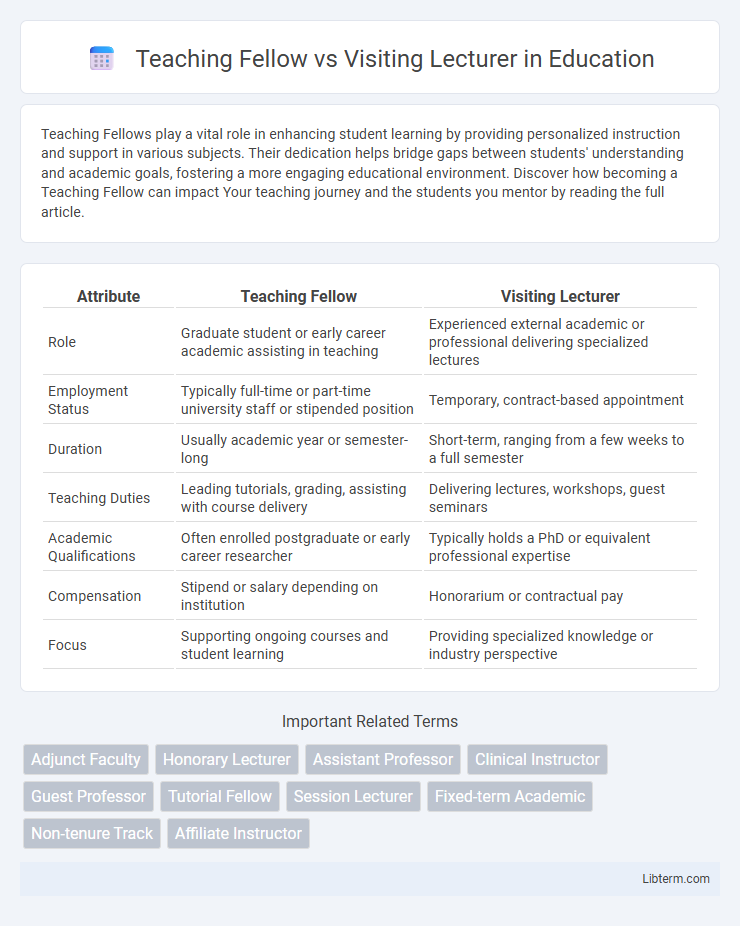Teaching Fellows play a vital role in enhancing student learning by providing personalized instruction and support in various subjects. Their dedication helps bridge gaps between students' understanding and academic goals, fostering a more engaging educational environment. Discover how becoming a Teaching Fellow can impact Your teaching journey and the students you mentor by reading the full article.
Table of Comparison
| Attribute | Teaching Fellow | Visiting Lecturer |
|---|---|---|
| Role | Graduate student or early career academic assisting in teaching | Experienced external academic or professional delivering specialized lectures |
| Employment Status | Typically full-time or part-time university staff or stipended position | Temporary, contract-based appointment |
| Duration | Usually academic year or semester-long | Short-term, ranging from a few weeks to a full semester |
| Teaching Duties | Leading tutorials, grading, assisting with course delivery | Delivering lectures, workshops, guest seminars |
| Academic Qualifications | Often enrolled postgraduate or early career researcher | Typically holds a PhD or equivalent professional expertise |
| Compensation | Stipend or salary depending on institution | Honorarium or contractual pay |
| Focus | Supporting ongoing courses and student learning | Providing specialized knowledge or industry perspective |
Overview of Academic Roles
Teaching Fellows primarily engage in delivering lectures, designing curricula, and assessing student work within a specific academic department, often holding a contractual or fellowship position focused on teaching excellence. Visiting Lecturers typically serve short-term appointments at universities or colleges, bringing external expertise to deliver specialized courses or seminars without permanent faculty responsibilities. Both roles contribute significantly to academic instruction but differ in duration, scope of duties, and integration within the institution's faculty hierarchy.
Defining Teaching Fellow
Teaching Fellows are academic professionals appointed primarily to deliver specialized instruction and support student learning within a university, often holding advanced degrees and actively engaged in curriculum development. They typically have longer-term contracts compared to Visiting Lecturers, who are usually temporary faculty members invited to teach specific courses without extensive involvement in institutional duties. The role of a Teaching Fellow emphasizes both teaching excellence and contribution to academic programs, distinguishing it from the more transient and narrowly focused Visiting Lecturer position.
Defining Visiting Lecturer
A Visiting Lecturer is typically an academic professional invited to teach specific courses or provide expertise at a university for a limited term, often bringing specialized knowledge from outside institutions. They generally hold advanced degrees and may continue their primary roles elsewhere while contributing to the host institution's curriculum. Teaching Fellows primarily assist with instructional support and may pursue further academic qualifications, whereas Visiting Lecturers focus on delivering specialized lectures or courses.
Key Responsibilities Compared
Teaching Fellows primarily concentrate on delivering undergraduate and postgraduate lectures, designing course materials, and supervising student projects, emphasizing academic instruction and mentorship within specific departments. Visiting Lecturers typically offer specialized expertise on a temporary basis, focusing on guest lectures, seminars, and contributing to curriculum development without the sustained administrative duties held by permanent staff. Key responsibilities differ in scope and duration, with Teaching Fellows engaged in comprehensive teaching roles and ongoing student support, while Visiting Lecturers provide targeted, short-term academic input.
Employment Duration and Contract Type
Teaching Fellows typically hold fixed-term contracts ranging from one to three years, emphasizing long-term engagement with institutions, whereas Visiting Lecturers often have short-term or sessional contracts, sometimes lasting only a semester or academic year. Employment duration for Teaching Fellows usually involves continuous appointments with structured renewal possibilities, contrasting with the more transient, contract-by-contract nature of Visiting Lecturers' roles. The contract type for Teaching Fellows is often academic staff status with associated benefits, while Visiting Lecturers usually work on hourly paid or casual contracts without extensive institutional benefits.
Qualifications and Academic Requirements
Teaching Fellows typically hold a doctoral degree or are completing a PhD, demonstrating advanced subject expertise and often engaging in research alongside teaching responsibilities. Visiting Lecturers usually possess a master's degree or higher with substantial professional experience, emphasizing practical knowledge and temporary academic appointments. Academic institutions prioritize Teaching Fellows for sustained teaching and research roles, while Visiting Lecturers fulfill short-term instructional needs without long-term commitments.
Involvement in Research and Curriculum
Teaching Fellows often engage extensively in research activities, contributing to academic publications and integrating their findings into course content, which enriches the curriculum with current knowledge. Visiting Lecturers typically focus more on delivering specialized teaching, bringing practical expertise to the classroom without a primary research mandate. This distinction impacts their involvement in curriculum development, with Teaching Fellows playing a more active role in shaping courses based on research insights, while Visiting Lecturers provide focused lectures without significant curriculum design responsibilities.
Career Progression Opportunities
Teaching Fellows often have structured career progression pathways, including opportunities for permanent academic positions and involvement in research activities, enhancing their professional growth. Visiting Lecturers typically occupy temporary roles with limited advancement prospects, focusing primarily on delivering specific courses without long-term institutional commitment. Institutions prioritize Teaching Fellows for future faculty appointments, making their positions more conducive to sustained academic careers.
Benefits and Challenges of Each Role
Teaching Fellows often benefit from increased opportunities for research collaboration and professional development but face challenges such as balancing teaching duties with academic research expectations. Visiting Lecturers gain exposure to diverse institutional cultures and flexible teaching schedules, yet may experience less job security and limited access to long-term career advancement. Both roles provide valuable teaching experience, with distinct trade-offs in terms of stability, professional growth, and institutional support.
Choosing Between Teaching Fellow and Visiting Lecturer
Choosing between a Teaching Fellow and a Visiting Lecturer position depends on the desired level of academic involvement and career trajectory. Teaching Fellows often have responsibilities beyond lecturing, including curriculum development and student mentoring, making the role suitable for those seeking deeper engagement in academia. Visiting Lecturers typically focus on delivering specific courses for a limited time, ideal for professionals wanting short-term teaching experience without long-term commitments.
Teaching Fellow Infographic

 libterm.com
libterm.com